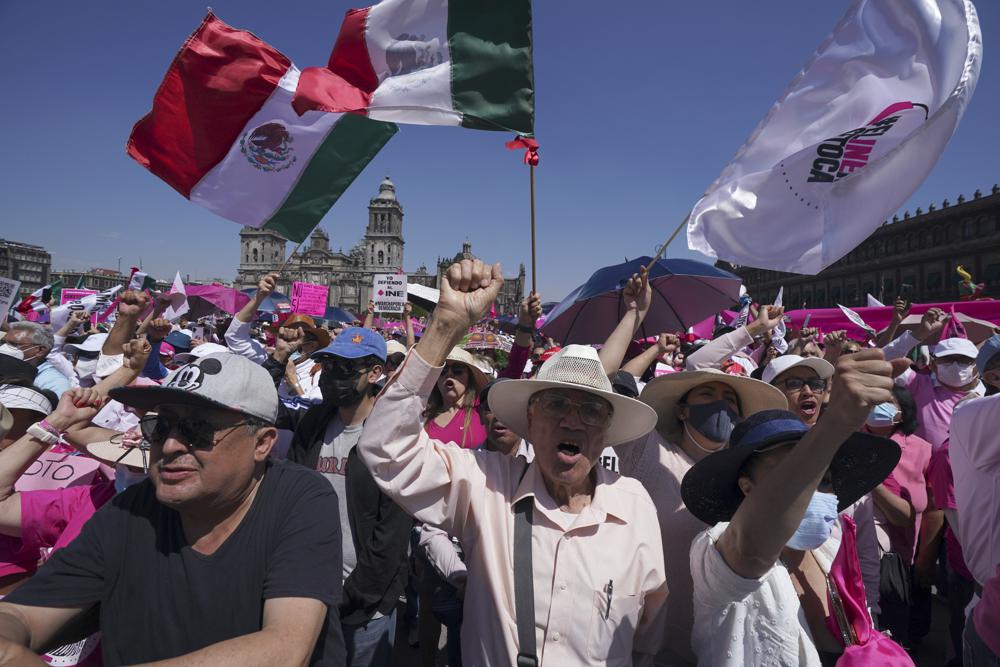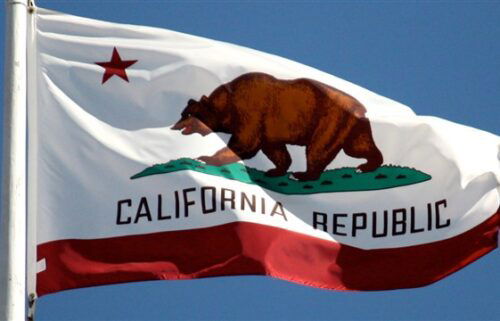Tens of thousands protest Mexico’s electoral law changes

MEXICO CITY (AP) — Tens of thousands of people filled Mexico City’s vast main plaza Sunday to protest President Andrés Manuel López Obrador’s electoral law changes they say threaten democracy and could mark a return to the past.
The plaza is normally thought to hold nearly 100,000 people, but many protesters who couldn’t fit in the square spilled onto nearby streets.
The marchers were clad mostly in white and pink — the color of the National Electoral Institute — and shouted slogans like “Don’t Touch my Vote!” Like a similar but somewhat larger march on Nov. 13, the marchers appeared somewhat more affluent than those at the average demonstration.
The electoral law changes drew attention from the U.S. government.
Brian A. Nichols, the U.S. assistant secretary of state for Western hemisphere affairs, wrote in his Twitter account that “Today, in Mexico, we see a great debate on electoral reforms that are testing the independence of electoral and judicial institutions.”
“The United States supports independent, well-resourced electoral institutions that strengthen democratic processes and the rule of law,” Nichols wrote.
López Obrador’s proposals were passed last week. Once enacted, they would cut salaries, funding for local election offices and training for citizens who operate and oversee polling stations. They would also reduce sanctions for candidates who fail to report campaign spending.
Mexico’s president denies the reforms are a threat to democracy and says criticism is elitist, arguing the institute spends too much money. He says the funds should be spent on the poor.
But protester Enrique Bastien, a 64-year-old veterinarian, said that with the reforms López Obrador “wants to return to the past” when “the government controlled elections.”
“It was a life with no independence,” said Bastien, recalling the 1970s and 80s when the Institutional Revolutionary Party, or PRI, ruled Mexico with fraud and handouts.
Fernando Gutierrez, 55, a small businessman, said López Obrador wanted to lead Mexico to a socialist government. “That’s obvious, from the aid going to Cuba,” Gutierrez said.
López Obrador has imported coronavirus vaccines, medical workers and stone railway ballast from Cuba, but has shown little taste for socialist policies at home.
Many other demonstrators were simply wary of the kind of vote miscounting, campaign overspending and electoral pressure tactics that were common in Mexico before the independent electoral agency was created in the 1990s.
López Obrador said Thursday he’ll sign the changes into law, even though he expects court challenges. Many at Sunday’s protest expressed hope that Mexico’s Supreme Court would overturn some of the changes, as courts have done with other presidential initiatives.
Lorenzo Cordova, the head of the National Electoral Institute, has said the reforms “seek to cut thousands of people who work every day to guarantee trustworthy elections, something that will of course pose a risk for future elections.”
López Obrador has appeared nonchalant about court challenges, saying Thursday that he believed the changes would be upheld because none was “outside the law.”
However, in the past he has frequently attacked Mexico’s judiciary and claimed judges are part of a conservative conspiracy against his administration.
The president’s strident pushback against the judiciary, as well as regulatory and oversight agencies, has raised fears among some that he is seeking to reinstitute the practices of the old PRI, which bent the rules to retain Mexico’s presidency for 70 years until its defeat in the 2000 elections.
Elections in Mexico are expensive by international standards, in part because almost all legal campaign financing is, by law, supplied by the government. The electoral institute also issues the secure voter ID cards that are the most commonly accepted form of identification in Mexico, and oversees balloting in the remote and often dangerous corners of the country.
López Obrador remains highly popular in Mexico, with approval ratings of around 60%. While he cannot run for reelection, his Morena party is favored in next year’s national elections and the opposition is in disarray.
Part of his popular appeal comes from railing against high-paid government bureaucrats, and he has been angered by the fact that some top electoral officials are paid more than the president.


